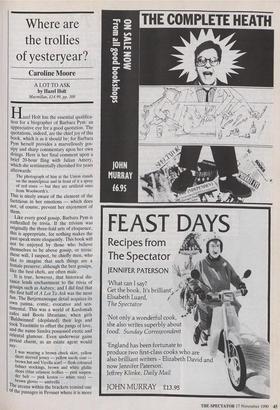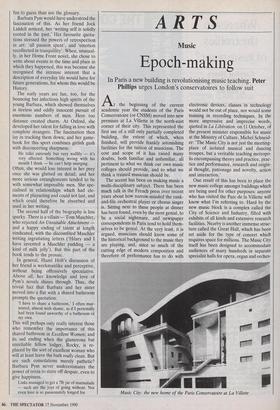Where are the trollies of yesteryear?
Caroline Moore
A LOT TO ASK by Hazel Holt
Macmillan, £14.99, pp. 308
Hazel Holt has the essential qualifica- tion for a biographer of Barbara Pym: an appreciative eye for a good quotation. The quotations, indeed, are the chief joy of this book, which is as it should be; for Barbara Pym herself provides a marvellously gos- sipy and sharp commentary upon her own doings. Here is her final comment upon a brief 20-hour fling with Julian Amery, which she sentimentally cherished for years afterwards:
The photograph of him at the Union stands on the mantelpiece and in front of it a spray of red roses — but they are artificial ones from Woolworth's.
This is nicely aware of the element of the factitious in her emotions — which does not, of course, prevent her enjoyment of them.
Like every good gossip, Barbara Pym is enthralled by trivia. If the trivium was originally the three-fold arts of eloquence, this is appropriate, for nothing makes the past speak more eloquently. This book will not be enjoyed by those who believe themselves to be above gossip, or trivia: these will, I suspect, be chiefly men, who like to imagine that such things are a female preserve; although the best gossips, like the best chefs, are often male.
It is true, however, that historical dis- tance lends enchantment to the trivia of gossips such as Aubrey; and I did find that the first half of A Lot To Ask was the most fun. The Betjemanesque detail acquires its own patina, comic, evocative and sen- timental. This was a world of Kardomah cafes and Boots librarians; when girls `Baldwinned' (depilated) their legs and took Yeastmite to offset the pangs of love, and the name Sandra possessed exotic and oriental glamour. Even underwear gains period charm, as an estate agent would say: I was wearing a brown check skirt, yellow short sleeved jersey — yellow suede coat brown hat and Viyella scarf — flesh coloured fishnet stockings, brown and white ghillie shoes (blue celanese trollies — pink suspen- der belt — pink kestos — white vest) brown gloves — umbrella . . . The arcana within the brackets remind one of the passages in Pevsner where it is more fun to guess than use the glossary.
Barbara Pym would have understood the fascination of this. As her friend Jock Liddell noticed, her 'writing self is solidly rooted in the past.' Her favourite quota- tions stressed the powers of retrospection in art: 'all passion spent', and 'emotion recollected in tranquillity'. When, unusual- ly, in her Home Front novel, she chose to write about events in the time and place in which they happened, this was because she recognised the intrinsic interest that a description of everyday life would have for future generations, for whom this would be History.
The early years are fun, too, for the bouncing but infectious high spirits of the young Barbara, which showed themselves in tireless and oddly innocent pursuit of enormous numbers of men. Here too distance created charm. At Oxford, she developed her talent for falling in love with complete strangers. The fascination then lay in tracking them down; and her game- book for this sport combines girlish gush with disconcerting sharpness: He talks curiously but very waffily — it's
very affected. Something wrong with his mouth I think — he can't help snurging. Often, she would lose interest in her prey once she was glutted on detail; and her more serious entanglements tended to be with somewhat impossible men. She spe- cialised in relationships which had ele- ments of playacting and could not last, and which could therefore be absorbed and used in her writing.
The second half of the biography is less sparky. There is a villain — Tom Maschler, who rejected An Unsuitable Attachment and a happy ending of talent at length vindicated, with the discomfited Maschler writing ingratiating letters (`Hilary and I have invented a Maschler pudding — a kind of milk jelly'). But this part of the book tends to the prosaic.
In general, Hazel Holt's discussion of her friend is workmanlike and perceptive, without being offensively speculative. Above all, her knowledge and love of Pym's novels shines through. Thus, the trivial fact that Barbara and her sister moved into a flat with a shared bathroom prompts the quotation:
`I have to share a bathroom,' I often mur- mured, almost with shame, as if I personally had been found unworthy of a bathroom of my own.
This will perhaps only really interest those who remember the importance of this shared bathroom in Excellent Women; and its sad ending when the glamorous but unreliable fellow lodger, Rocky, is re- placed by the sort of excellent woman who will at least leave the bath really clean. But are such consolations merely pathetic? Barbara Pym never underestimates the power of trivia to stave off despair, even to give happiness.
Links managed to get a 7Ib jar of marmalade --- such are the joys of going without. Not even love is so passionately longed for.
























































 Previous page
Previous page